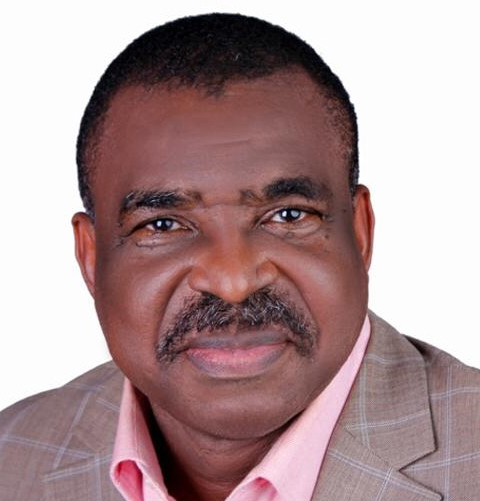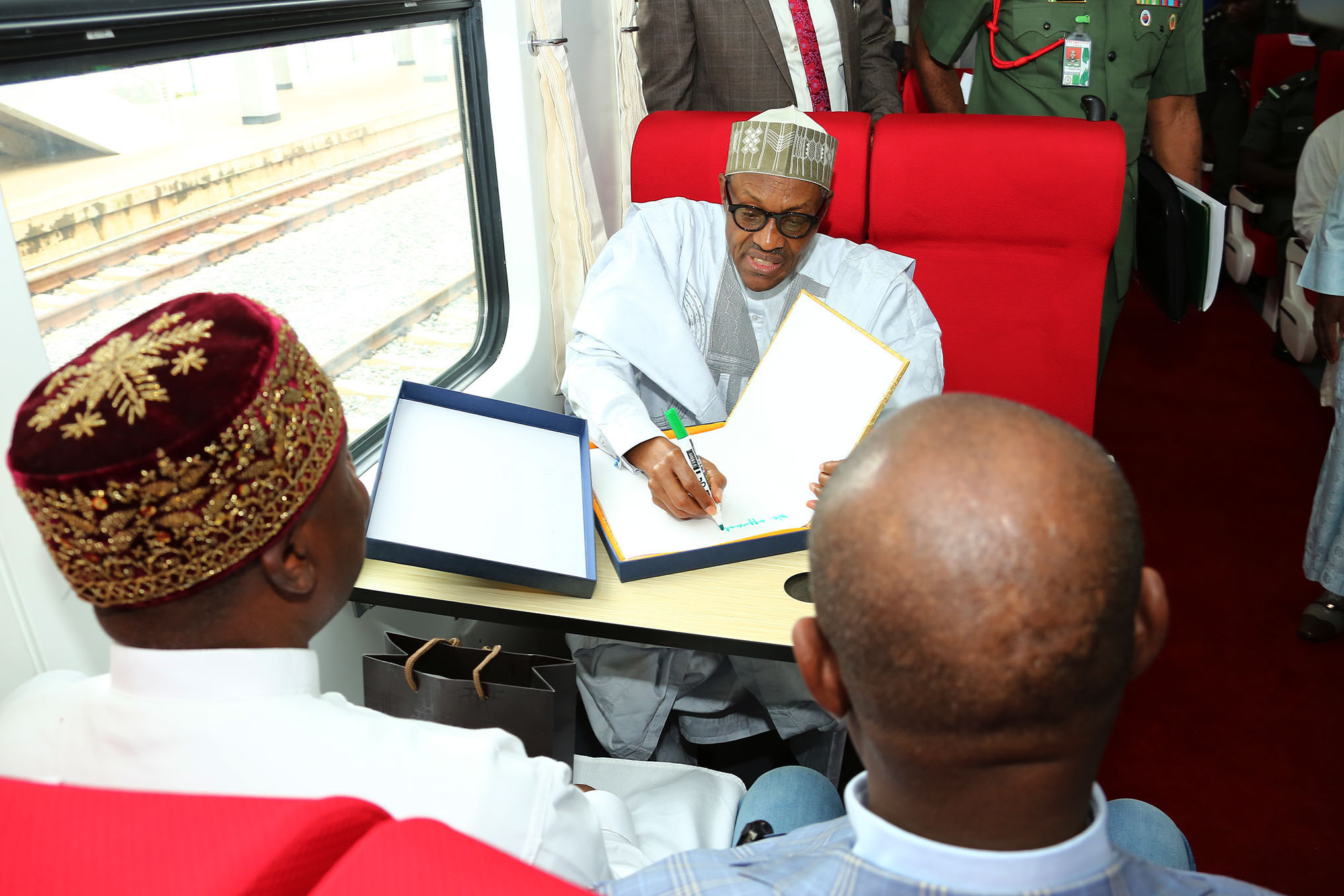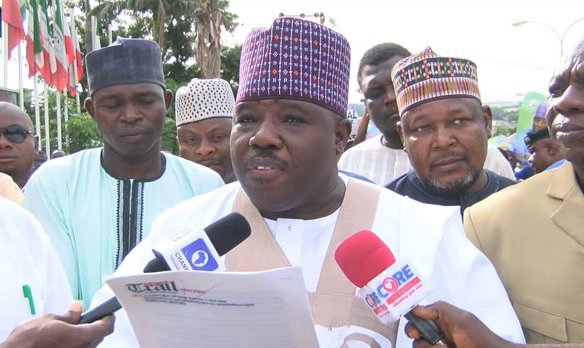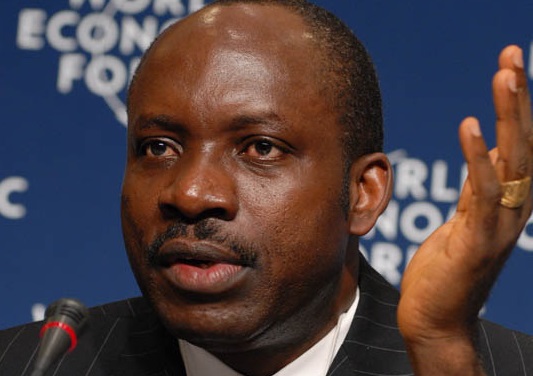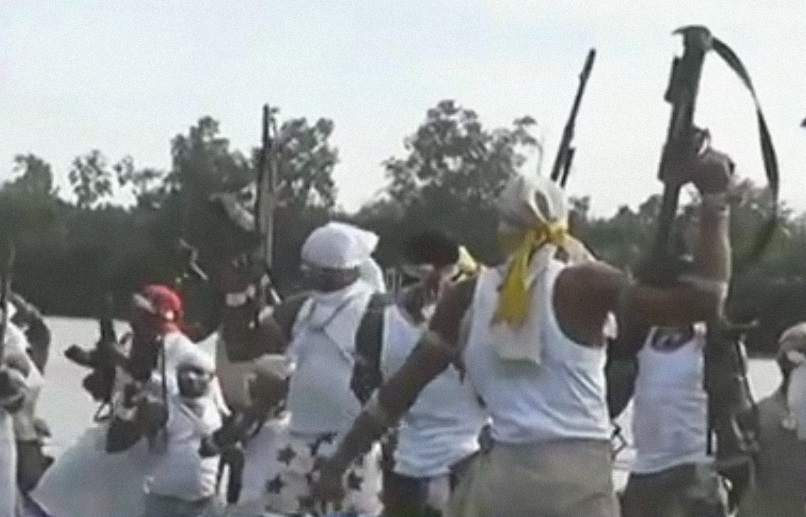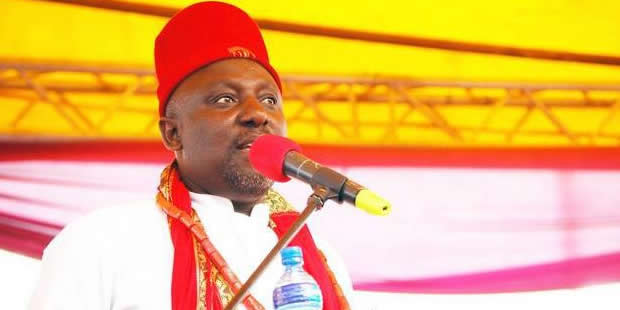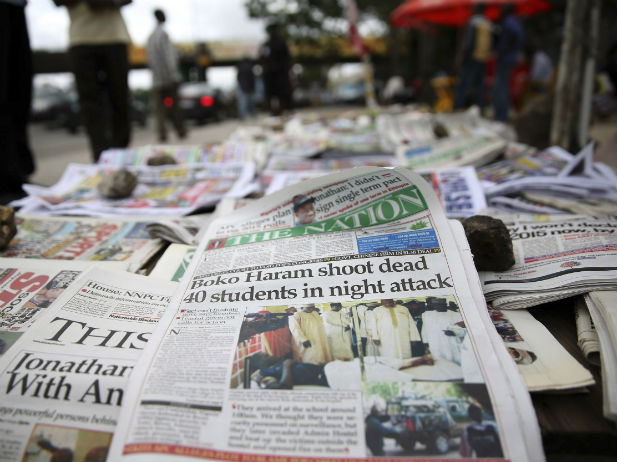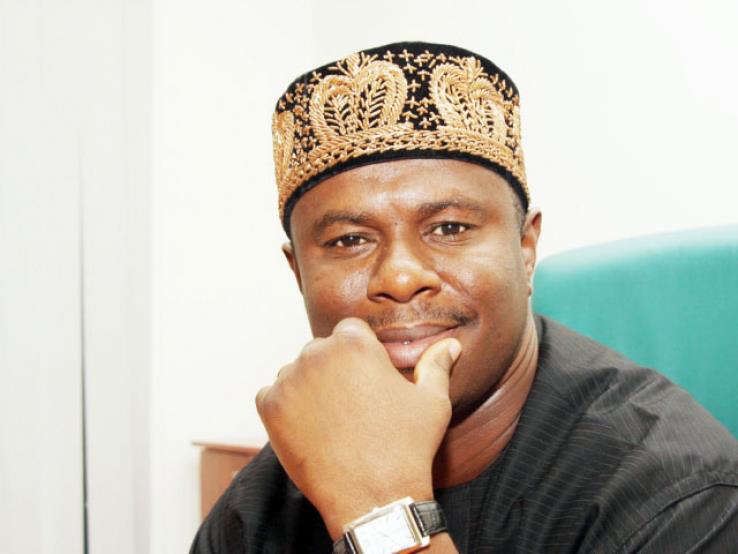President Muhammadu Buhari signing document on the train. With him are Minister of Transportation, Mr Rotimi Amaechi and Minister of State Aviation, Senator Hadi Sirka as President Commission/Flag-off Abuja-Kaduna Commercial Operation Rail Station at IDU Station in Abuja.
A farmer who was extorted by govt officials over land matters in northern India was so aggrieved and wanted to take his pound of flesh, so he dumped a bag of 40 snakes into the offices of the dept of land as a reprisal action.
The farmers response (in the above narrative) to those who corruptly fleeced him of his hard earned money was rather vicious,but some would argue that his back was pushed against the walls, so he had to fight back with the only lethal weapon in his possession, snakes.
Everyday in Nigeria,as motorists we are confronted with police corruption via officers soliciting bribes to overlook traffic offenses.
As importers of goods, we face the menace of customs operatives at the border posts, sea and airports, where we are constantly harassed for under the table settlements of customs duties in ‘long rooms’ that end up in the private pockets of officers undermining the nation’s treasury.
Advertisement
We are also often at the mercy of officers of the immigration service who demand bribe before we are issued international passports or expatriate quotas, if an entrepreneur and engaged in businesses that require foreigners as employees.
How about the nuisance of local govt officials who seize every opportunity to strip compatriots of their hard earned money via spurious charges ranging from road, radio/tv and borehole taxes which end up in their private pockets.
Equally tainted is the sales and distribution of petroleum products in Nigeria.
Advertisement
Beginning from the opaque method adopted in issuance of licenses/permits by the Department of Petroleum Resources, DPR to the allocation of crude oil for sale to selected local and international firms,Nigerian authorities covertly or overtly have made the system susceptible to rigging hence the oil/gas sector is brimming with corruption.
As a friend pointed out recently, Nigeria is probably the only country that sells her crude oil products to third parties, instead of trading the product directly with refineries.
Equally shady is the allocation of refined petroleum products to dealers, particularly kerosine by the Pipelines and Products Marketing Company,PPMC which is also brimming with corruption.
With the withdrawal of Govt control over the importation and sale of diesel and lately petrol, the price of those products has stabilized and the monumental corruption hitherto associated with them, has been reduced to the barest minimum, if not completely eliminated.
Advertisement
What the trend of corruption catalogued above reveals is that it is govt’s involvement in the provision of public utilities that breeds corruption.So one of the fundamental ways of killing corruption is for govt to hands off such activities and allow the private sector take over.
Before the privatisation of the public utilities like NEPA and NITEL, Nigerians could not get connected to public electricity grid or have telephone lines, unless bribes were offered to govt officials in charge. But since Govt’s withdrawal from directly providing electricity and telephones services ,the horrendous corruption in those sectors have also ceased to exist.
These positive developments clearly confirm that,it is Govt’s involvement in the delivery of utility services that is engendering graft in Nigeria.
Arising from the above, it stands to reason that as soon as Nigerian sea and air ports, still in govt clutches are privatized, the level of so called ‘petty’ corruption would also abate.
Advertisement
However, given president Buhari’s abiding interest in retaining Govt’s participation in some sectors that he still considers essential – a public sector governance strategy which was fashionable in the 1970s and now contrary to what’s obtainable in the 21st century which has witnessed a paradigm shift in public sector leadership-it is doubtful if Aso Rock will be willing to privatize the remaining govt corporations soon, if at all.
The assertion above is predicated on the premise that the present administration appear to believe more in command and control structure of governance, which was the reason for setting up of refineries, steel rolling mills and vehicle assembly plants in the 1970s and 80s that president Buhari sometimes romanticises or cites with nostalgia when lamenting reversal of fortunes in Nigeria since the last time he was on the saddle some 31 years ago. That’s why unbundling of the corruption breeding behemoths like Nigeria National Petroleum Corporation, NNPC , Nigerian Ports Authority, NPA etc to private sector operators in order to tame the corruption monster in Nigeria may be not be the priority of the Govt in power now and therefore a different kettle of fish.
Advertisement
In the light of the foregoing,can president Buhari really be said to be serious about fighting corruption fundamentally? If anything, sustaining govt ownership of NNPC, NPA where systemic corruption thrives, would suggest that the authorities prefer to deal with the symptoms of corruption rather than the substance of it?
This is because apart from the political big wigs who are stealing us blind in crimes that can be referred to as political/economic heist involving billions of dollars ,for which they are now being arraigned through president Buhari’s anti corruption war, the so called ‘petty’ corruption perpetrated via civil service bureaucracy that Nigerians contend with on a daily basis, is equally wreaking havoc on the economy.
Advertisement
In fact,it is estimated by researchers that about $20-40 billion is lost by developing countries annually via corruption.
Considering the cumulative effect of the innocuous corruption that hardly make news headlines, there is need for president Buhari to tackle it with equal zeal as he is doing with the political/ economic ones.
Advertisement
In the absence of turning over public utilities into the hands of more efficient and effective private sector operators to stem corruption , l would like to see a situation where our anti crime agencies,investigative journalists and civil society groups organize stings to burst individuals and corporations engaging in the type of corrupt practices earlier highlighted.
Take the PPMC where kerosine officially sells for N73.00 while product is being sold for as much as N180.00 to N250.00 as officials demand bribe of N1m per tanker as reported by Thisday newspaper of Thursday 28th July 2016.
Both PPMC officials and kerosine dealers allegedly involved in ‘the asking and giving’ are humans not ghosts, so they can be encouraged to blow the whistle as it is done all over the world.
This can only happen if the National Assembly,NASS passes the whistleblowers bill and the presidency gives the law teeth to bite. Under such atmosphere, president Buhari won’t be the only one fighting corruption, as members of the public would also be given the impetus to join in the prosecution of the war against corruption.
Only recently ,whistle blowers in Russia opened a ‘Can of Worms’ by exposing corruption in sports with govt complicity in ‘doping’ by athletes during the SOCHI Olympics in Russia that saw the country topping the medals table at the end of the sports festival.
The discovery prompted the banning of some Russian athletes from participating in the forth coming Olympics to be hosted in Brazil by International Olympic Federation, IOC.
Similarly,it is whistle blowers in Australia that recently brought to light,the abuse of youths in Australian prisons resulting in the public condemnation and outrage leading to the current push for massive reforms in the prison system.
Although citizen policing is enshrined in our status books, it is rarely practiced hence only president Buhari and the anti graft agencies- EFCC , ICPC , CCB, CCT etc have exclusive mandate to crack down on the crime.
As we all can affirm, one man can not possibly organize an effective riot.
But one man may lead a riot,albeit he would need a crowd to execute it. Any one who thinks or acts otherwise would be deemed as being messianic.
The assertion above is underscored by the conventional wisdom embedded in the lgbo and Yoruba proverb , ” It takes a whole village to raise a child”. The establishment must make Nigerians hold the anti corruption war as dearly to their hearts as raising a child, and by that l mean there is need for the involvement of all Nigerians in the fight against corruption which has now assumed the dimension of a culture in Nigeria.
In all honesty, it is about time that the anti graft war assumed the dimension of a movement, so that it would be enduring , as opposed to being one man show, that could end once the ‘owner’ of the agenda is off the scene.
Mr president recently reportedly commented in an interview in THE INTERVIEW, a new online magazine being published by Azubuike Isiekwene, that he is ready to prosecute anybody suspected to be corrupt, even if they are members of his party, APC, provided the anti graft agencies are convinced about the allegations to pursue the case further.
That is a wonderful proposition, but the challenge is not in writing the petition but the difficulty lies in the ability or capacity of the complainant to persuade the law enforcement agencies to follow through with the petition.
People in the opposition parties and civil society organizations believe the crime fighting agencies that are supposed to be neutral more often than not , do only the bidding of the Govt in power, so genuine petitions may be tossed into the garbage bin-where they have merit or not-except they are green lighted by the authorities in Aso Rock villa.
Evidently, there has been calls for the investigation of some identified public officials whose record fall short of incorruptibility standards or conduct negate extant rules in public service, but such calls have fallen on deaf ears.
To that extent, mr president needs to differentiate between the war against corruption and political persecution which his opponents allege by broadening the membership of the Presidential Advisory Committee Against Corruption, headed by prof ltse Sagay.
The judgement of that body which mr president seems to be relying on largely in the execution of his anti corruption war is casting a dark and long shadow on the altruism or lack there of, in the war against corruption as critics are finding it difficult separating genuine fight against financial sleaze from political vendetta.
It needs no further emphasis that Govt needs to build up trust between it and more members of society who are getting more skeptical about the criteria being applied and the ultimate objective of the anti corruption war.
Furthermore, the claim in THE INTERVIEW to the effect that mr president said he will not add private sector practitioners to his economic team for the fear that they would hijack the economy is also in my judgement imprudent.
It’s like the case of a weight watcher who opts to avoid food for the fear of obesity and ends up suffering from anorexia.
Both end up producing different but abnormal results,so the correct thing would have been to strike a balance between eating in moderation and becoming a vegetarian.
The culture of private and public sector dichotomy should be consigned to the past as both must function in tandem to facilitate societal and economic progress because it has been proven in other climes that one can not function effectively without the other.
In my considered opinion, mr president can still find a few good businessmen in the private sector to bring fresh perspectives into his economic management team. To assuage his fear of hijack, he can keep an eagle eye on them.
In fact to demonstrate mr president’s continued empathy with grass roots constituents, he should establish a presidential advisory committee on economic development similar to the committee on anti corruption headed by Itse Saggay. Thats one way of reconnecting with the masses.
That the intensity of the campaign against graft has crippled the economy, is no longer in contention, so what should be of utmost concern now to the administration is not how to bring more culprits to book, as more selective ghosts (ex govs) are being exhumed for prosecution,but how to bring succor to the long suffering Nigerians who have reached their wits end.
To achieve the forgoing objective, going forward, at least 90% attention has to be paid to getting Nigerian economy back on even keels, this means president Buhari has to devote as much time to accomplishing the eradication of poverty, hunger and starvation in Nigeria as he has done with the fight against corruption.The idea of seeking clerics assistance to calm down the poor via preaching of patience in mosques or churches is not an efficacious panacea, but a clear and demonstrable effort to pull the masses out of the present state of hunger and starvation, would help regain their confidence.
Furthermore, there needs to be public accountability by the anti graft agencies and that oversight has to be carried out by the various committees of the National Assembly, NASS , civil society groups and the media.
That is currently not the case as the corruption bursting agencies seem to be the judge and jury at the same time which is tantamount to jungle justice and which in my view dehumanizes us as a people.
As Nigeria becomes the ninth, 9th African country and 70th in the world to join Open Government Partnership, a global coalition in the fight against corruption,like Transparency International, TI, the ideals and ethical guidelines set out in this article, are the minimum requirements that are expected to be obtainable in member countries.
BUDGETit,an advocacy group focused on prudent budgeting is doing a good job alerting Nigerians on the skewness of the budget and it’s negative effect on the populace but as somebody once observed,the vociferous civil society organizations and human rights advocates that were barking like Bulldogs during the last regime, are now silent or at best, mewing like kittens.How can there be change when those that are supposed to advocate it are afraid to speak up?
One veritable tool that Nigeria is yet to fully harness in fighting corruption is technology and the blame could be placed squarely on the unstable state of electricity supply but that would change soon with the ongoing privatization of power supply in Nigeria.
In a report titled TECHNOLOGY IS HELPING THE FIGHT AGAINST CORRUPTION published in Huffington Post of 12/09/2011,by the pair of Caroline Anstey, Managing Director, World Bank Group and Leonard McCarthy, World Bank’s Integrity Vice President, they noted that “there is no single quick fix for curbing corruption. But there are steps that can and should be taken to raise the cost of being corrupt-to send a powerful message that corruption doesn’t pay”.
Arguing further, the duo stated “We already see how technology can make a difference. Take Indonesia, where an Urban Poverty Program, which distributes $150 million annually in World Bank and government funding, has successfully harnessed the Internet and mobile phone technology to enhance project monitoring, transparency, and overall effectiveness. Or Moldova, where government has committed to using technology to improve governance and citizen participation. Or the Philippine, where Finance Secretary Purisma has started an online public tip-off program called Pera Ng Bayan, which netted dozens of tax evaders and smugglers within its first six months of operation “.
The World Bank technocrats narrated how ” the simple use of a phone or Internet has helped the (world) Integrity Vice Presidency, known as INT, in investigations of fraud and corruption in (World) Bank financed projects. INT’s regular hotline already received about 26,000 hits a year. In the past financial year, about 370 were directly related to (world) Bank financed projects. During the year, the world bank sanctioned 34 firms and individuals, while multilateral development banks as a group honored 37 cross-debarments. During that same time, the World Bank built precautions into high-risk projects valued at more than $14 billion dollars, while stopping a number of tainted contracts before they were awarded”.
It may be recalled that former Agriculture minister, Akin Adewunmi, now president of African Development Bank, AfDB,once proposed the purchase of GSM telephones for farmers as a tool for curbing fertilizer distribution,which is legendary for the obscene level of corruption involved in the exercise particularly because it is subsidized by Govt.
The then agriculture minister’s voice was drowned by the cacophony from members of the public who could not phantom the benefits of buying GSM phones for farmers, so the idea was jettisoned.
Universally, it’s been acknowledged through research that the less interaction humans have with money,the less the amount of fraud generated.That’s why in advanced societies, practically all levies and taxes are paid online.
So the ideal thing would be to promote adoption of technology for payment of taxes and levies,but unfortunately as earlier stated,instability of electricity power supply in Nigeria is a major impediment to the application of technology as a tool for curbing corruption.
Already, the introduction of cashless society policy by the central bank of Nigeria, CBN being implemented via the compulsory registration of bank customers known as Banks Verification Number,BVN helped a great deal in tracking and trapping most of the estimated N3 trillion so far recovered from looters under president Buhari’s watch.
While awaiting the stability of electricity power supply to leverage for the enjoyment of greater use of technology to fight corruption , passing of the whistle blower proposal into law by NASS; the sensitization of ordinary folks about the ills of corruption and what they can do in their little corners to forestall or foil corruption through massive public enlightenment ; introduction of anti corrupting clubs in schools to get our children involved at infancy; and therefore train them to develop the culture of abhorring corruption and the setting up of War Against Corruption, WAC brigades (variation of the famous WAI brigade) in Ministries, Departments and Agencies, MDAs to harness people power; just as fighting corruption by Govt in a more transparent and open manner, devoid of partisanship,can help Nigeria in a systematic and less rancorous way to kill corruption before corruption kills Nigeria.
The point being made is that to kill corruption, we don’t have to literarily chase a bull into a China shop with the calamitous consequence of destroying all the priceless and ornate wares in the shop in the process of trying to catch the bull, as we seem to have done in the past one year in Nigeria.
Put succinctly, fighting corruption is not a hundred meters dash but a long distance race so slow and steady approach has to be adopted so the monster can be tamed without grinding the economy of Nigeria to a halt.
Onyibe, a development strategist and futurologist is a former commissioner in delta state Govt and an alumnus of the Fletcher School of Law and Diplomacy, Tufts University, Medford, Massachusetts, USA.
Views expressed by contributors are strictly personal and not of TheCable.
